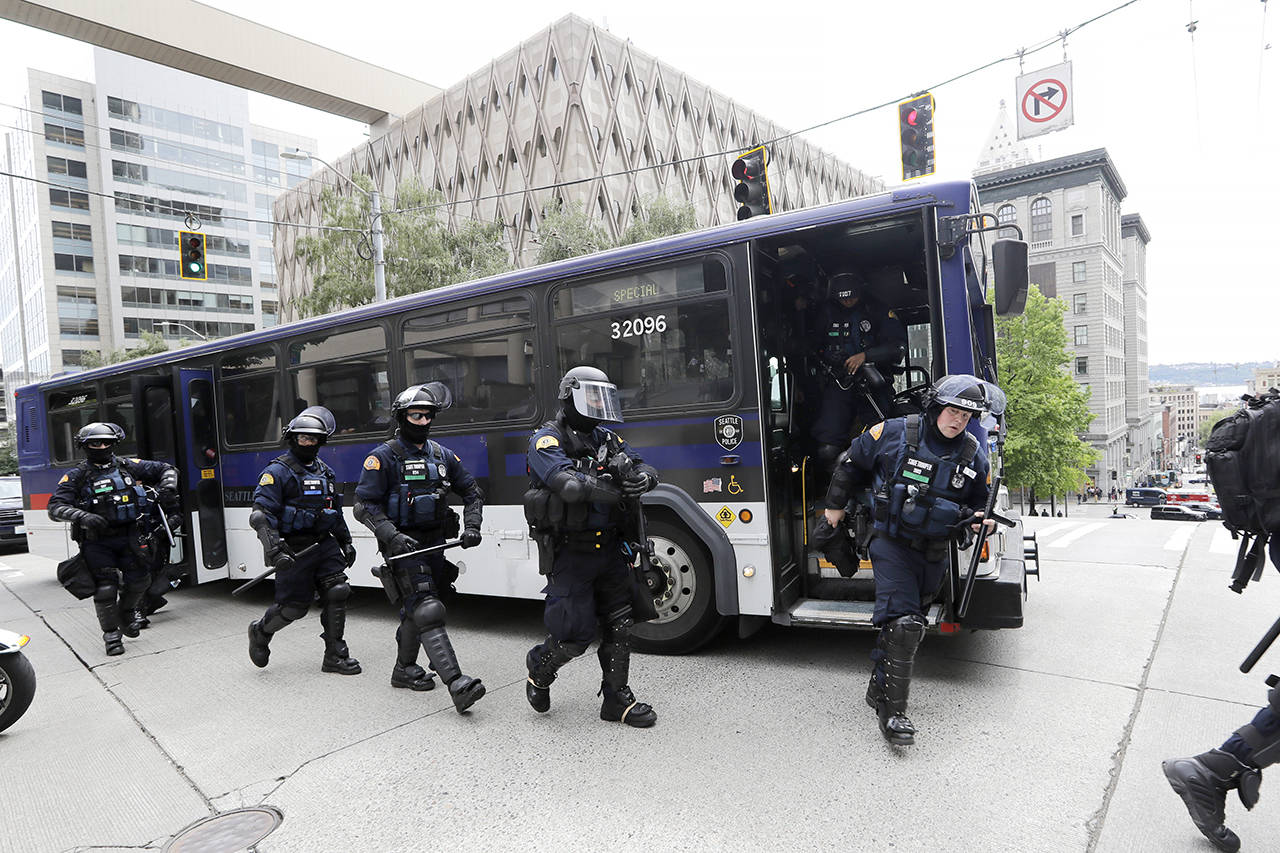By Gene Johnson / Associated Press
The state Senate has approved a measure restricting certain police tactics and gear, including the use of neck restraints and tear gas, after police killings of Black people sparked tumultuous racial-justice protests last year.
Majority Democrats pushed the bill through on a 27-22 vote Tuesday night over the objections of Republicans who warned it would endanger officers and the public alike.
The measure, a centerpiece of the Democrats’ police-reform agenda, would allow the use of tear gas only in response to riots that occur in jails or prisons, or to deal with barricaded subjects or hostage situations. It bans the use of choke holds, neck restraints and no-knock warrants, limits the use of high-speed pursuits, and restricts the acquisition of military equipment by police departments.
“This last year has been seared into a lot of our consciences,” said Sen. Jamie Pedersen, D-Seattle, referencing the police killings of George Floyd, a Black man, in Minneapolis and Breonna Taylor, a Black woman killed in Louisville, Kentucky, by authorities who had a no-knock warrant. “We as a people can no longer tolerate the damage, the collateral damage, that has been done to the residents of our state by the overuse, misuse and abuse of these tools.”
The bill was originally sponsored by state Rep. Jesse Johnson, D-Federal Way, and was amended by the Senate, with changes that included barring the use of tear gas as a means to quell protests or riots. It now returns to the House for approval of the changes made in the Senate.
Johnson said Wednesday he will ask his caucus to concur with the revised version.
“It solidifies the fabric of the bill” outlawing chokeholds, neck restraints and no-knock warrants, he said. And it strengthened language concerning vehicle pursuits and use of tear gas, he noted.
One Republican, Sen. Keith Wagoner of Sedro-Woolley, voted with Democrats in passing the bill after his amendment was adopted allowing police departments to continue acquiring mine-resistant, ambush-protected armored vehicles even as other military equipment is banned.
Two Democrats, Kevin Van De Wege of Sequim and Steve Hobbs of Lake Stevens, voted against the measure.
Hobbs said he supported the vast majority of the bill but couldn’t stomach the ban on using tear gas to quell riotous demonstrations — though other less-lethal options, including pepper spray and rubber bullets, remain available to police.
Hobbs said he himself nearly had to use tear gas to disperse a riot, and he called removing that option “a recipe for disaster.” Hobbs explained in a later interview that the incident occurred during a deployment to Kosovo as a member of the U.S. Army.
“Things can get out of hand,” Hobbs said. “In a moment’s notice you can be overwhelmed. This is about the lives and safety of not just people who peacefully protest, but also our officers.”
But Pedersen — who lives on Seattle’s Capitol Hill, where police sometimes used tear gas on protestors with little to no provocation during last summer’s demonstrations — insisted, noting that once deployed, the tear gas can’t be controlled. It affected many residents in the dense neighborhood who were not involved in the protests.
Much of the debate focused under what conditions police should be able to engage in vehicle pursuits. Under the bill, police would only be allowed to give chase when there is probable cause to believe a person has committed an escape or a violent offense, or when there is reasonable suspicion — a lower standard — to believe the person is driving under the influence.
Officers would need a supervisor’s approval before engaging in the pursuit, and they could only do so if the person they’re chasing poses an imminent threat to the safety of others.
Yakima Republican Sen. Curtis King said the Democrats were putting police at risk.
“We keep eliminating the tools … and the procedures they need to protect us and protect themselves,” he said. “Why in the world would anyone want to be a police officer under these circumstances?”
The Legislature is also working on measures that would create an independent office to review police use of deadly force; require police to intervene when colleagues use force excessively and to report wrongdoing by other officers; and reform the arbitration system by which officers can appeal discipline.
Herald writer Jerry Cornfield contributed.
This story has been modified to correct an anecdote regarding tear gas told by state Sen. Steve Hobbs of Lake Stevens.
Talk to us
> Give us your news tips.
> Send us a letter to the editor.
> More Herald contact information.

























